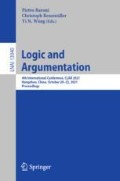Abstract
In the field of collective argumentation, multiple agents may have distinct knowledge representations and individual preferences. In order to obtain reasonable collective outcome for the group, either individual frameworks should be merged or individual preference should be aggregated. However, framework merging and preference aggregation are different procedures, leading to disagreements on collective outcome. In this paper, we figure out a solution to combine framework merging, argumentative reasoning and incomplete preference aggregation together. Furthermore, a couple of rational postulates are proposed to be the criteria for the reasonability of collective outcome obtained based on our approach.
Access this chapter
Tax calculation will be finalised at checkout
Purchases are for personal use only
Notes
- 1.
For any set \(S, \#(S)\) denotes the cardinality of S.
References
Bodanza, G., Tohmé, F., Auday, M.: Collective argumentation: a survey of aggregation issues around argumentation frameworks. Argument Comput. 8, 1–34 (2017)
Coste-Marquis, S., Devred, C., Konieczny, S., Lagasquie-Schiex, M.-C., Marquis, P.: On the merging of Dung’s argumentation systems. Artif. Intell. 171, 730–753 (2007)
Delobelle, J., Haret, A., Konieczny, S., Mailly, J.G., Rossit, J., Woltran, S.: Merging of abstract argumentation frameworks. In: KR, pp. 33–42 (2016)
Cayrol, C., Lagasquie-Schiex, M.-C.: Weighted argumentation systems: a tool for merging argumentation systems. In: 2011 IEEE 23rd International Conference on Tools with Artificial Intelligence, pp. 629–632 (2011)
Gabbay, D., Rodrigues, O.: A numerical approach to the merging of argumentation networks. In: Fisher, M., van der Torre, L., Dastani, M., Governatori, G. (eds.) CLIMA 2012. LNCS (LNAI), vol. 7486, pp. 195–212. Springer, Heidelberg (2012). https://doi.org/10.1007/978-3-642-32897-8_14
Delobelle, J., Konieczny, S., Vesic, S.: On the aggregation of argumentation frameworks: operators and postulates. J. Log. Comput. 28, 1671–1699 (2018)
Konczak, K., Lang, J.: Voting procedures with incomplete preferences. In: Proceedings of the IJCAI 2005 Multidisciplinary Workshop on Advances in Preference Handling, vol. 20 (2005)
Dung, P.M.: On the acceptability of arguments and its fundamental role in nonmonotonic reasoning, logic programming and n-person games. Artif. Intell. 77, 321–357 (1995)
Amgoud, L., Cayrol, C.: Inferring from inconsistency in preference-based argumentation frameworks. J. Autom. Reason. 29, 125–169 (2002)
Amgoud, L., Vesic, S.: Rich preference-based argumentation frameworks. Int. J. Approximate Reasoning 55, 585–606 (2014)
Kaci, S., van der Torre, L., Villata, S.: Preference in abstract argumentation. In: 7th International Conference on Computational Models of Argument (COMMA), vol. 305, pp. 405–412 (2018)
Airiau, S., Bonzon, E., Endriss, U., Maudet, N., Rossit, J.: Rationalisation of profiles of abstract argumentation frameworks: characterisation and complexity. J. Artif. Intell. Res. 60, 149–177 (2017)
Lisowski, G., Doutre, S., Grandi, U.: Aggregation in value-based argumentation frameworks. arXiv preprint arXiv:1907.09113 (2019)
Liao, B., Li, C.: A solution to ethical dilemmas based on preference aggregation and formal argumentation. J. Hunan Univ. Sci. Technol. (Soc. Sci. Ed.) 23(3), 33–49 (2020)
Chen, W., Endriss, U.: Preservation of semantic properties in collective argumentation: the case of aggregating abstract argumentation frameworks. Artif. Intell. 269, 27–48 (2019)
Dunne, P.E., Marquis, P., Wooldridge, M.: Argument aggregation: basic axioms and complexity results. In: Computational Models of Argument, vol. 129–140. IOS Press (2012)
Amgoud, L., Vesic, S.: Two roles of preferences in argumentation frameworks. In: Liu, W. (ed.) ECSQARU 2011. LNCS (LNAI), vol. 6717, pp. 86–97. Springer, Heidelberg (2011). https://doi.org/10.1007/978-3-642-22152-1_8
Coste-Marquis, S., Konieczny, S., Mailly, J.G., Marquis P.: On the revision of argumentation systems: minimal change of arguments statuses. In: KR, pp. 52–61 (2014)
Bench-Capon, T.J.: Persuasion in practical argument using value-based argumentation frameworks. J. Log. Comput. 13, 429–448 (2003)
Lu, T., Boutilier, C.: Robust approximation and incremental elicitation in voting protocols. In: IJCAI, pp. 287–293 (2011)
Baumeister, D., Neugebauer, D., Rothe, J., Schadrack, H.: Verification in incomplete argumentation frameworks. Artif. Intell. 264, 1–26 (2018)
Acknowledgments
The research reported in this paper was supported in part by the “2030 Megaproject”—New Generation Artificial Intelligence of China under Grant 2018AAA0100904, the Natural Science Foundation of Zhejiang Province under Grant No. LY20F030014, and the National Social Science Foundation Major Project of China under grant No. 20 & ZD047.
Author information
Authors and Affiliations
Corresponding author
Editor information
Editors and Affiliations
Rights and permissions
Copyright information
© 2021 Springer Nature Switzerland AG
About this paper
Cite this paper
Li, C., Liao, B. (2021). Integrating Individual Preferences into Collective Argumentation. In: Baroni, P., Benzmüller, C., Wáng, Y.N. (eds) Logic and Argumentation. CLAR 2021. Lecture Notes in Computer Science(), vol 13040. Springer, Cham. https://doi.org/10.1007/978-3-030-89391-0_16
Download citation
DOI: https://doi.org/10.1007/978-3-030-89391-0_16
Published:
Publisher Name: Springer, Cham
Print ISBN: 978-3-030-89390-3
Online ISBN: 978-3-030-89391-0
eBook Packages: Computer ScienceComputer Science (R0)

